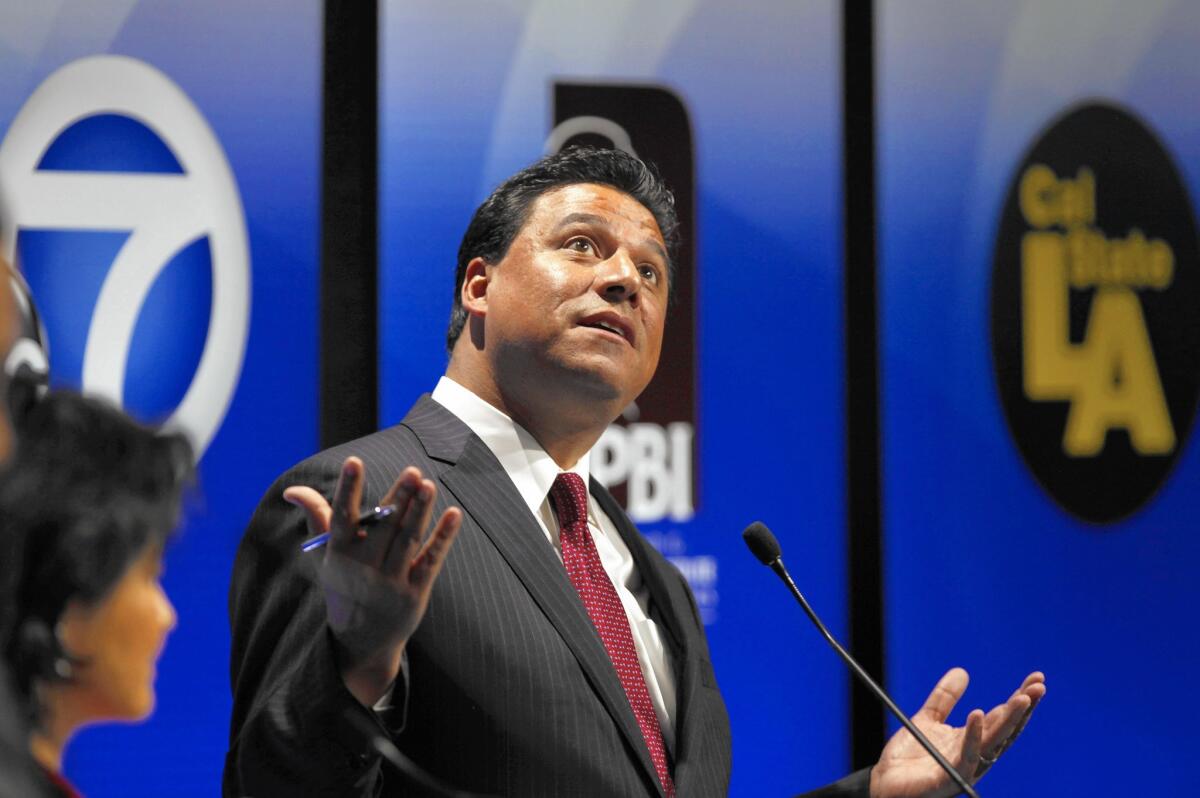First & Spring: Rivals take on Huizar over business interests, development decisions

- Share via
Los Angeles City Councilman Jose Huizar wasn’t satisfied with L.A.’s strategy for bringing in big hotels.
At a hearing last summer, Huizar said the city’s policy analysts should get “more creative” in their approach to subsidizing projects around the downtown convention center. The city, he said, should consider offering bigger hotels — those with more than 600 rooms — 100% of the bed taxes they generate, plus 35% of other new taxes that normally would flow to the budget.
“This economic upswing is going to pass us by soon,” Huizar told his colleagues. “And we’ve got to just go as big as we can with these incentives as quick as we can.”
Council members won’t take up a hotel subsidy strategy until after the March 3 election, when voters decide whether to reelect Huizar to a third and final term. But his approach to real estate development, and special interests overall, has become a major target for his challengers.
Former County Supervisor Gloria Molina, one of four candidates challenging Huizar, called the push for bigger subsidies “a total giveaway” to private developers. On the campaign trail, she generally has portrayed Huizar as too accommodating to those who seek favor at City Hall: labor unions, business groups, billboard companies and others.
“The [city] budget is really controlled by a lot of special interests — everybody taking care of everybody else, except for the taxpayer,” said Molina, who served 23 years on the county board.
Huizar, whose district stretches from downtown to Eagle Rock, said he hasn’t gone easy on special interests. He called Molina’s assertions an election-year gimmick and said endorsements from more than 200 high-profile district residents, as well as the Sierra Club, show that he meets the needs of his constituents. Molina, as a member of the Metropolitan Transportation Authority board, repeatedly pushed construction projects that antagonized district residents, Huizar said.
“She never goes out and asks for community input,” he said.
In some recent instances, Huizar took steps to help companies facing city government resistance. He backed a $39-million downtown hotel subsidy even after a high-level executive with the city convention center said the project would probably have been built without taxpayer help. The councilman also helped an apartment developer win approval of a pedestrian bridge — one aimed at helping tenants bypass the homeless — over the objections of the local planning commission.
Molina, for her part, has a reputation for being stubborn and even unpredictable, said Becky Dennison, co-director of a nonprofit group that fights for concessions from downtown developers on affordable housing and other issues.
“When she’s on your side, she’s fantastic because she doesn’t budge. When she’s not, it’s terrible because she doesn’t budge,” said Dennison, who has been a critic of both candidates.
Over the last year, individuals and companies with business at City Hall have poured money into Huizar’s reelection effort. Huizar has raised more than $850,000, more than three times the total collected by Molina and two other challengers, social worker Nadine Diaz and community activist Mario Chavez. Independent groups, including businesses and the Los Angeles County Federation of Labor, have spent another $386,000 to help Huizar’s reelection bid, money that is not covered by the city’s campaign contribution limits.
Gary Toebben, who heads the Los Angeles Area Chamber of Commerce, said his group was channeling all of its campaign money this election year, approximately $200,000, into efforts to reelect Huizar. Toebben said he was especially troubled by Molina’s recent assertion that downtown has “too much density.”
“[Huizar’s] attitude about growth downtown, about the addition of more businesses and more residents, is exactly what Los Angeles needs,” he said.
Huizar’s opponents say that money is a sign the lawmaker is too willing to accommodate business interests. “Just … look at the decision-making. He lines up for the large developers, who in turn kick back during the political campaigns,” said Chavez, a former organizer with Service Employees International Union.
------------
FOR THE RECORD
Feb. 23, 9:42 a.m.: A previous version of this story said Chavez worked for SEIU Local 721. He has worked for other SEIU locals, including Local 620 in Santa Barbara.
------------
Huizar and his allies say there are many examples of the councilman standing up to business interests. Last fall, Huizar backed a higher minimum wage for workers at larger hotels, despite protests from the chamber and other groups. Several years ago, he successfully fought a plan to build a 24-unit subdivision in El Sereno, allowing the land to become open space. And throughout his tenure, he has fought efforts to complete the 710 Freeway extension from El Sereno to Pasadena.
El Sereno resident Joe Cano, a Huizar supporter, described the 710 project as the darling of consulting and construction companies who want lucrative public works contracts. Cano also said he doesn’t trust Molina, who only recently announced she’s dropped her support for a tunnel version of the project, due to cost.
“She’s shown no support or concern as to how it would negatively impact the neighborhood,” he said.
Molina says she now wants alternatives to the project examined.
During campaign appearances, she has cited her success in bringing parkland to downtown Los Angeles — part of a larger effort to bring residential and hotel towers to a site across from Walt Disney Concert Hall.
Nearly a decade ago, Molina wanted Related, developer of the Grand Avenue project, to provide $50 million up front for a park, even if the city’s effort to approve the project fell apart. Billionaire Eli Broad voiced alarm over the demand and wanted Mayor Antonio Villaraigosa to intervene, according to a 2006 memo written by a high-level Villaraigosa aide.
In the memo, then-Deputy Mayor Robert “Bud” Ovrom called Molina’s request “totally unreasonable.” But in the end, Related provided the money up front, even though its project was stalled by the recession, Ovrom said last week.
Grand Park, which stretches from City Hall to the Music Center, opened in 2012. Related also agreed to incorporate 90 units of affordable housing in the project, which is once again going through the approval process.
“She cared about the park and she cared about the affordable housing. And she won on both,” Ovrom said.
More to Read
Sign up for Essential California
The most important California stories and recommendations in your inbox every morning.
You may occasionally receive promotional content from the Los Angeles Times.














